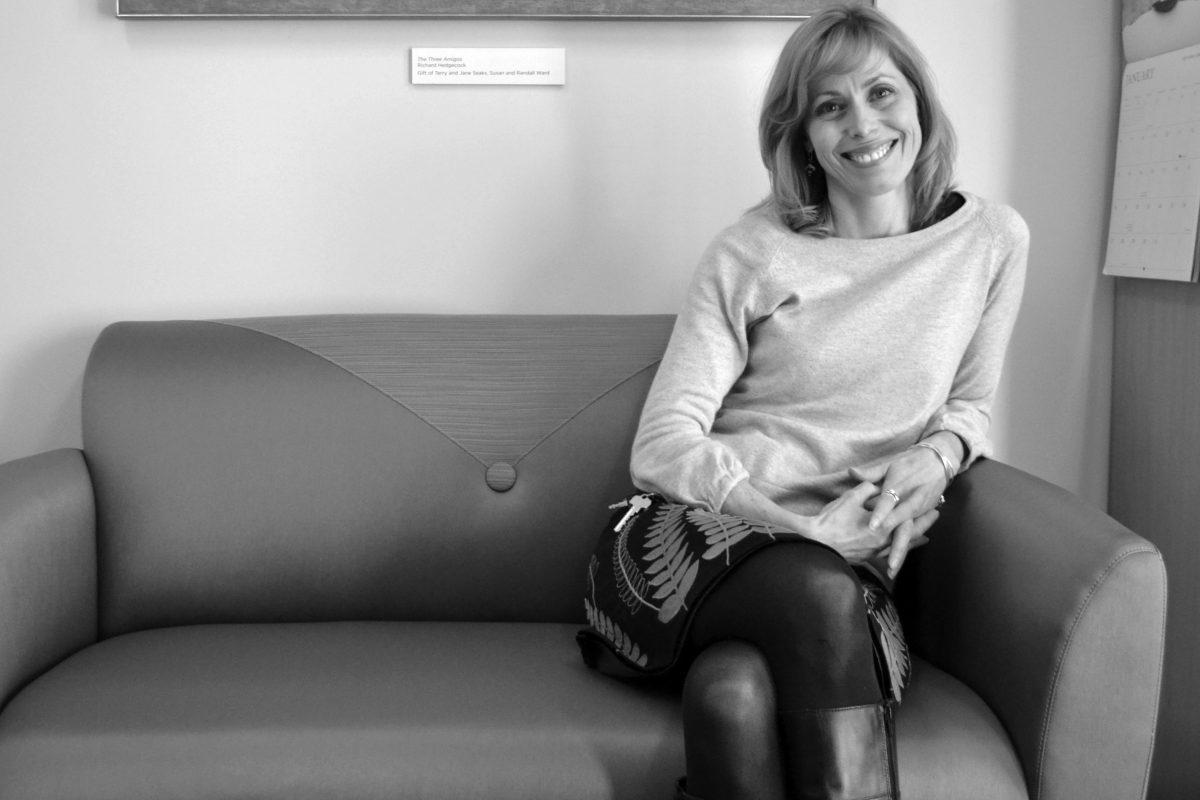In a small office tucked away in N.C. State University’s Veterinary Health Complex sits Jeannine Moga, the veterinary school’s new clinical counselor. Moga supports a unique client dynamic working with families experiencing the loss of four-legged friends.
A graduate of University of Minnesota’s Department of Social Work, Moga joined the College of Veterinary Medicine three months ago.
“There are some great opportunities here within NCSU to do community outreach,” Moga said. “There’s a lot of impressive work going on within veterinary medicine. This is a very accomplished research program and I know that State is very well-known across many programs for doing a lot of community and intro-school collaboration. That was all very attractive to me.”
Moga’s original plan was to practice animal-assisted therapy. It was her training at the veterinary school across the street from the University of Minnesota that sparked her interest in the human-animal bond.
“I was really interested in working with people and their pets and there was a great diversity when working there with pets and their families,” Moga said. “I simply never left the field.”
According to Moga, the bond between humans and animals is incredibly unique. While in some aspects it can be compared to the human-human bond, the human-animal bond is dynamic.
“Human beings are really tricky creatures and in relationships with each other there are lots of expectations,” Moga said. “We sometimes have great difficulty creating trust with one another, there’s often a lot of judgment. Animals just accept us for who we are.”
Moga explained that animals play a consistent role in our environments and provide us with a sense of stability.
“It’s a very dynamic and interesting bond for me to look at,” Moga said.
While the idea of having clinical counselors stationed at veterinary offices has been around for some time, the action of doing so is relatively new.
“The first program started probably about 30 years ago,” Moga said. “It has taken some time to grow and it’s pretty rare to have a mental health professional or social services professional integrated into a veterinary setting.”
Moga’s clientele come to see her for a number of reasons; she sees families or individuals that come to the veterinary complex for reasons varying from behavioral to medical care.
“People who come here often need help figuring out what to do, they need to better understand their options,” Moga said. “Sometimes they need to troubleshoot around finance because specialty care is an incredibly expensive and prohibitive cost for a lot of people. We have to make sure all the family members are on board and agree on what to do next.”
According to Moga, animals are in almost every aspect of our lives. Unbeknownst to us, we allow our furry friends into areas of our lives that we couldn’t fathom letting our friends and family into.
“Animals are pretty much everywhere with us, especially when we’re home,” Moga said. “There’s an intimacy with animals that we don’t often have with other humans. Animals are inherently trustworthy; they don’t blab our secrets and they don’t try to interfere in our relationships, and so what I often will tell grieving people is, ‘how many family members of friends do you allow to crawl under the covers with you at night or follow you into the bathroom?’”
Moga explained that it’s this sense of entirety that makes the loss of a pet so comparable to the loss of a human.
“Animals are plugged into parts of our lives we don’t often allow other people to be part of and for that reason alone losing them as a completely different feeling,” Moga said. “It’s just as challenging as losing a human loved one.”
Moga stressed that her job isn’t just for those grieving the loss of a pet, there’s more to her job description.
“It’s not just grieving pet owners, a lot of times this is what I would normally call medical social work. Social workers have been involved in medical settings for many years in human hospitals. In many ways what I do here is a form of medical social work. The only difference is my patients have four legs.”
Like that of any social worker, Moga’s close contact with grief and loss can follow her home.
“It’s very emotionally intense work, working with suffering patients that can’t tell you what’s wrong is really tough sometimes,” Moga said. “A big part of my job here is helping the other colleagues of mine, the veterinary team members, so that we don’t take our work home, feeling some of the negative effects of this emotional intensity.”
The emotional intensity is what reminds Moga of her work’s importance and purpose.
“There are very few supports in the community surrounding people and animal issues,” Moga said. “There is a distinct lack of understanding of how important these relationships are. Everyone needs someone they can talk to, someone who won’t judge what they’re going through, or think they’re crazy for being so close to the animal that they have. I’m just glad I can do that.”








